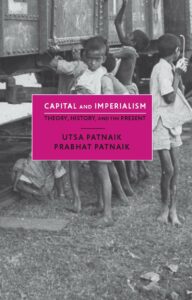Capital and Imperialism: Theory, History, and the Present
REVIEWS, 1 Mar 2021
Utsa Patnaik and Prabhat Patnaik | Montly Review - TRANSCEND Media Service
 February 2021 – Those who control the world’s commanding economic heights, buttressed by the theories of mainstream economists, presume that capitalism is a self-contained and self-generating system. Nothing could be further from the truth. In this pathbreaking book—winner of the Paul A. Baran-Paul M. Sweezy Memorial Award—radical political economists Utsa Patnaik and Prabhat Patnaik argue that the accumulation of capital has always required the taking of land, raw materials, and bodies from noncapitalist modes of production. They begin with a thorough debunking of mainstream economics. Then, looking at the history of capitalism, from the beginnings of colonialism half a millennium ago to today’s neoliberal regimes, they discover that, over the long haul, capitalism, in order to exist, must metastasize itself in the practice of imperialism and the immiseration of countless people.
February 2021 – Those who control the world’s commanding economic heights, buttressed by the theories of mainstream economists, presume that capitalism is a self-contained and self-generating system. Nothing could be further from the truth. In this pathbreaking book—winner of the Paul A. Baran-Paul M. Sweezy Memorial Award—radical political economists Utsa Patnaik and Prabhat Patnaik argue that the accumulation of capital has always required the taking of land, raw materials, and bodies from noncapitalist modes of production. They begin with a thorough debunking of mainstream economics. Then, looking at the history of capitalism, from the beginnings of colonialism half a millennium ago to today’s neoliberal regimes, they discover that, over the long haul, capitalism, in order to exist, must metastasize itself in the practice of imperialism and the immiseration of countless people.
A few hundred years ago, write the Patnaiks, colonialism began to ensure vast, virtually free, markets for new products in burgeoning cities in the West. But even after slavery was generally abolished, millions of people in the Global South still fell prey to the continuing lethal exigencies of the marketplace. Even after the Second World War, when decolonization led to the end of the so-called “Golden Age of Capitalism,” neoliberal economies stepped in to reclaim the Global South, imposing drastic “austerity” measures on working people. But, say the Patnaiks, this neoliberal economy, which lives from bubble to bubble, is doomed to a protracted crisis. In its demise, we are beginning to see—finally—the transcendence of the capitalist system.
Praise for A Theory of Imperialism (Columbia University Press, 2016):
“The ideas outlined in A Theory of Imperialism are central to understanding the construction of the unequal global system in the past and in the present.”
_______________________________________________
is professor emerita at the Centre for Economic Studies and Planning, Jawaharlal Nehru University, New Delhi.
is professor emeritus at the Centre for Economic Studies and Planning, Jawaharlal Nehru University, New Delhi.
Tags: Capitalism, Marxism, Reviews
DISCLAIMER: The statements, views and opinions expressed in pieces republished here are solely those of the authors and do not necessarily represent those of TMS. In accordance with title 17 U.S.C. section 107, this material is distributed without profit to those who have expressed a prior interest in receiving the included information for research and educational purposes. TMS has no affiliation whatsoever with the originator of this article nor is TMS endorsed or sponsored by the originator. “GO TO ORIGINAL” links are provided as a convenience to our readers and allow for verification of authenticity. However, as originating pages are often updated by their originating host sites, the versions posted may not match the versions our readers view when clicking the “GO TO ORIGINAL” links. This site contains copyrighted material the use of which has not always been specifically authorized by the copyright owner. We are making such material available in our efforts to advance understanding of environmental, political, human rights, economic, democracy, scientific, and social justice issues, etc. We believe this constitutes a ‘fair use’ of any such copyrighted material as provided for in section 107 of the US Copyright Law. In accordance with Title 17 U.S.C. Section 107, the material on this site is distributed without profit to those who have expressed a prior interest in receiving the included information for research and educational purposes. For more information go to: http://www.law.cornell.edu/uscode/17/107.shtml. If you wish to use copyrighted material from this site for purposes of your own that go beyond ‘fair use’, you must obtain permission from the copyright owner.